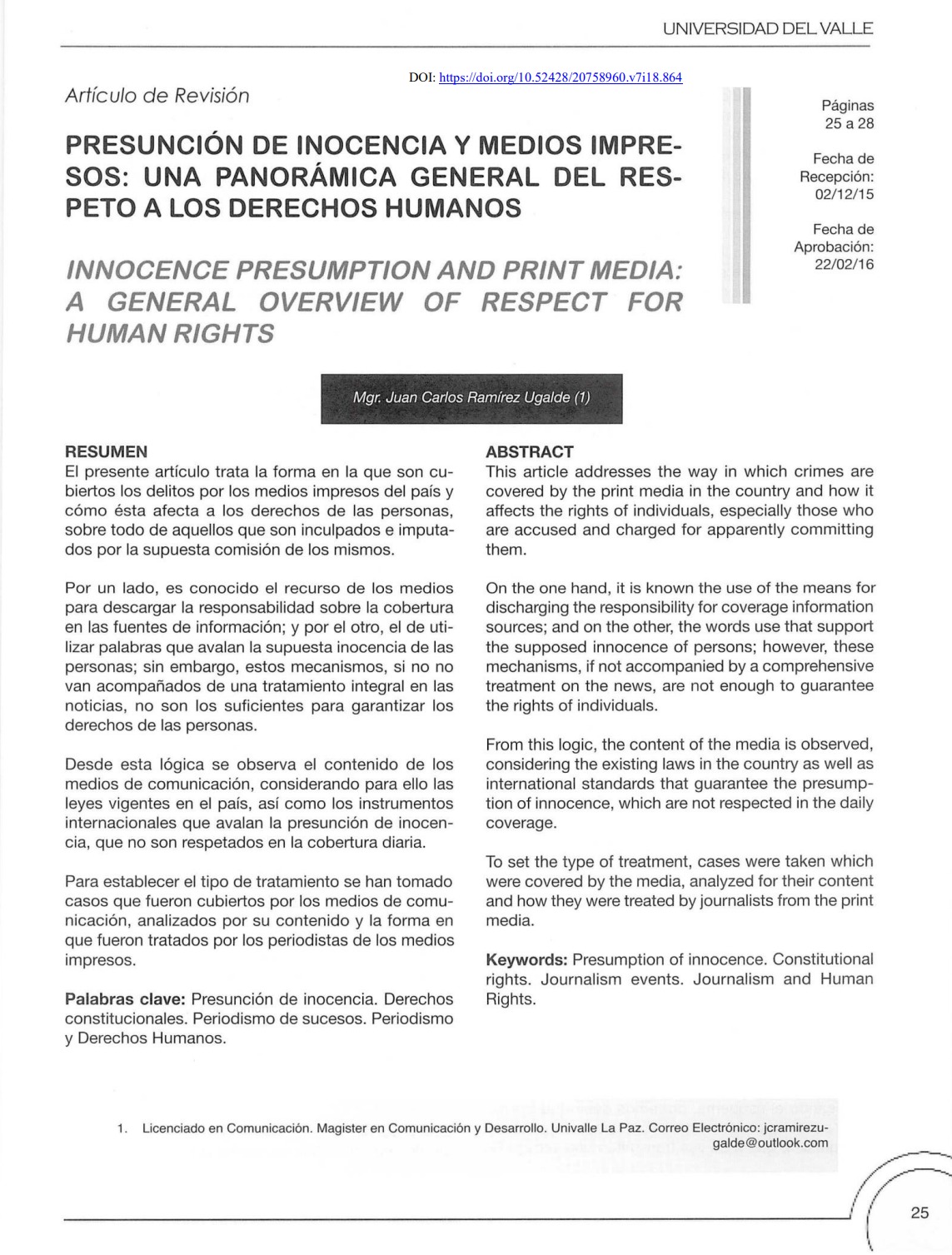Innocence Presumption and Print Media: A General Overview of Respect for Human Rights
DOI:
https://doi.org/10.52428/20758960.v7i18.864Keywords:
Presumption of innocence, Constitutional rights, Journalism events, Journalism and Human RightsAbstract
This article addresses the way in which crimes are
covered by the print media in the country and how it affects the rights of individuals, especially those who are accused and charged far apparently committing them. On the one hand, it is known the use of the means far discharging the responsibility for coverage information sources; and on the other, the words use that support the supposed innocence of persons; however, these mechanisms, if not accompanied by a comprehensive treatment on the news, are not enough to guarantee the rights of individuals. From this logic, the content of the media is observed, considering the existing laws in the country as well as international standards that guarantee the presumption of innocence, which are not respected in the daily coverage. To set the type of treatment, cases were taken which were covered by the media, analyzed far their content and how they were treated by journalists from the print media.
Downloads
References
Organización de las Naciones Unidas (Septiembre de 2014) http://www.un.org/es/documents/udhr/
Organización de Estados Americanos (Septiembre de 2014) https://www.oas.org/di1/esp/tratados_B-32_Convencion_Americana_sobre_Derechos_H umanos.Pdf
lnfoleyes (Septiembre de 2014) http://bolivia.infoleyes.com/shownorm.php?id=1009
RAMIREZ UGALDE, Juan Carlos. El periodismo por dentro: el proceso de distribución social del conocimiento. Tesis de Maestría; Universidad Andina Simón Bolívar; La Paz, 2011.
TUCHMAN, Gaye; La objetividad como ritual estratégico. En Cuadernos de Información y Comunicación Nº 4; Editorial Universidad Complutense de Madrid; ESPAÑA, 1999. pp. 199 -218.
GOLDING, Peter y ELLIOTT, Philip. Making the news. Editorial Longman. Lóndres y Nueva York, 1979.
• EPSTEIN, Edward Jay. News from nowheres: televisien and the news. Editorial !van R. Dee. Chicago, 2000.
• FISHMAN, Mark. La fabricación de la noticia. Editorial tres tiempos. Buenos Aires, 1983.
• GRAMUNT DE MORAGAS, Jase. La comunicación y el poder. En Medios de Comunicación en democracia. Editorial Fundemos. La Paz, 1999.
• McCOMBS, Maxwell. Estableciendo la agenda: el impacto de los medios en la opinión pública y el conocimiento. Editorial Paidós. Barcelona, 2006.
• McCOMBS, Maxwell. Influencia de las noticias sobre nuestras imágenes del mundo. En BRYANT, Jennings y ZILLMANN, Dolf (Compiladores). Los efectos de 3)Ios medios de comunicación: investigaciones y teorías. Editorial Paidós. Barcelona. Primera edición 1996. Pág. 13 -34.
• RAMÍREZ UGALDE, Juan Carlos y CEVALLOS TEJADA, Francisco (2011 ); Jueces y periodistas: un punto de encuentro (Los casos de Bolivia y Ecuador). Editorial Comisión Andina de Juristas. Lima, 2011.
• RAMÍREZ UGALDE, Juan Carlos. El periodismo por dentro: El proceso de distribución social del conocimiento. Tesis de Maestría. Universidad Andina Simón Bolívar. La Paz, 2011
• TUCHMAN, Gaye. La Objetividad como ritual estratégico. En Cuadernos de Información y Comunicación Nº 4. Editorial Universidad Complutense de Madrid. Madrid, 1999. pp. 199 -218 .

Downloads
Published
How to Cite
Issue
Section
License
Copyright (c) 2016 Juan Carlos Ramírez Ugalde

This work is licensed under a Creative Commons Attribution 4.0 International License.
Authors who publish with this journal agree to the following terms:
- Authors retain copyright and grant the journal right of first publication with the work simultaneously licensed under a Creative Commons Attribution License 4.0 that allows others to share the work with an acknowledgement of the work's authorship and initial publication in this journal.
- Authors are able to enter into separate, additional contractual arrangements for the non-exclusive distribution of the journal's published version of the work (e.g., post it to an institutional repository or publish it in a book), with an acknowledgement of its initial publication in this journal.
- Authors are permitted and encouraged to post their work online (e.g., in institutional repositories or on their website) prior to and during the submission process, as it can lead to productive exchanges, as well as earlier and greater citation of published work.









